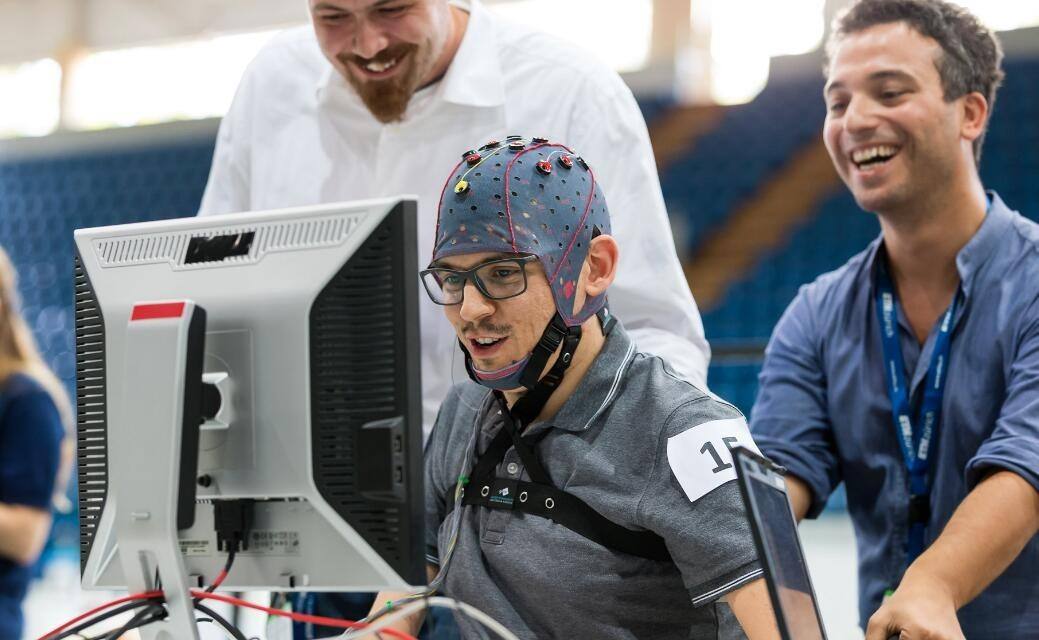As our Technology Quarterly in this issue explains, the pace of research into BCIs and the scale of its ambition are increasing.
正如本期的《科技季刊》所詮釋的那樣,對BCI的研究步伐及其雄心壯志的規(guī)模正在加快和擴(kuò)大。
Both America's armed forces and Silicon Valley are starting to focus on the brain.
美國軍方和硅谷都正在開始聚焦人腦。
Facebook dreams of thought-to-text typing.
臉書夢想著思維轉(zhuǎn)化為文字的打字技術(shù)。
Kernel, a startup, has $100m to spend on neurotechnology.
創(chuàng)業(yè)公司Kernel有1000萬美元要花在神經(jīng)技術(shù)上面。
Elon Musk has formed a firm called Neuralink; he thinks that, if humanity is to survive the advent of artificial intelligence, it needs an upgrade.
馬斯克組建了一家名為Neuralink的公司。他認(rèn)為,在人工智能降臨之后,如果人類想生存下去,需要一次升級。

Entrepreneurs envisage a world in which people can communicate telepathically, with each other and with machines, or acquire superhuman abilities, such as hearing at very high frequencies.
創(chuàng)業(yè)者們描繪了一個(gè)身在其中的人們能夠相互或是與機(jī)器之間進(jìn)行心靈感應(yīng)式的溝通交流、或是獲得諸如以甚高頻聽聲辨音這樣的超人能力的世界。
These powers, if they ever materialise, are decades away.
如果想讓它們成為看得見摸得著的東西,這些力量尚有數(shù)十年之遙。
But well before then, BCIs could open the door to remarkable new applications.
但是,在那之前,BCI可能對全新的應(yīng)用敞開大門。
Imagine stimulating the visual cortex to help the blind, forging new neural connections in stroke victims or monitoring the brain for signs of depression.
設(shè)想一下刺激視覺皮層以幫助盲人、在中風(fēng)患者身上再造新的神經(jīng)連接,或者是為了抑郁跡象而監(jiān)視大腦等諸如此類的應(yīng)用前景吧。
By turning the firing of neurons into a resource to be harnessed, BCIs may change the idea of what it means to be human.
把神經(jīng)元的燃燒轉(zhuǎn)化為一種可資利用的資源,借此,BCI或許就能改變做人意義何在的思想。
Sceptics scoff.
懷疑論者不屑一顧。
Taking medical BCIs out of the lab into clinical practice has proved very difficult.
讓醫(yī)用腦機(jī)接口走出實(shí)驗(yàn)室進(jìn)入臨床實(shí)踐,已經(jīng)被證明是非常困難的。
The BrainGate system used by Mr Kochevar was developed more than ten years ago, but only a handful of people have tried it out.
被科其瓦使用的BrainGate系統(tǒng)早在十多年前就被開發(fā)出來了。但是,只有屈指可數(shù)的幾個(gè)人試用過這種系統(tǒng)。
Turning implants into consumer products is even harder to imagine.
讓植入物變成消費(fèi)品甚至更難想象。
The path to the mainstream is blocked by three formidable barriers—technological, scientific and commercial.
通向主流的道路被三大的障礙——技術(shù)的、科學(xué)的和商業(yè)的——給堵住了。












